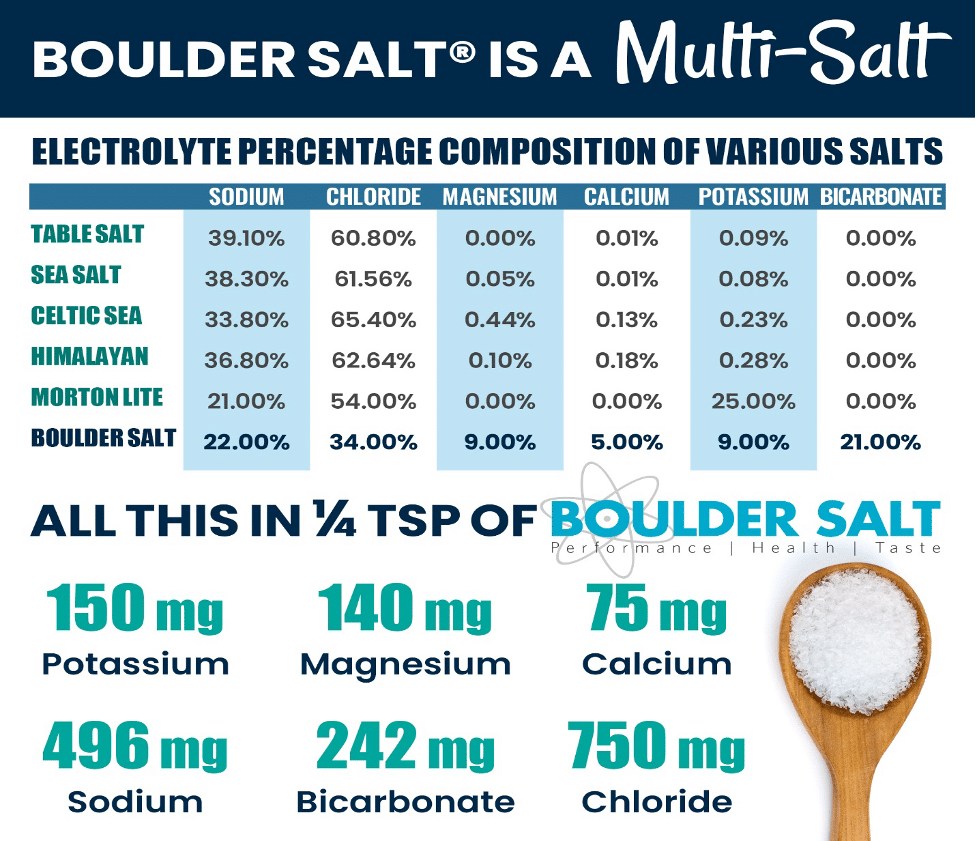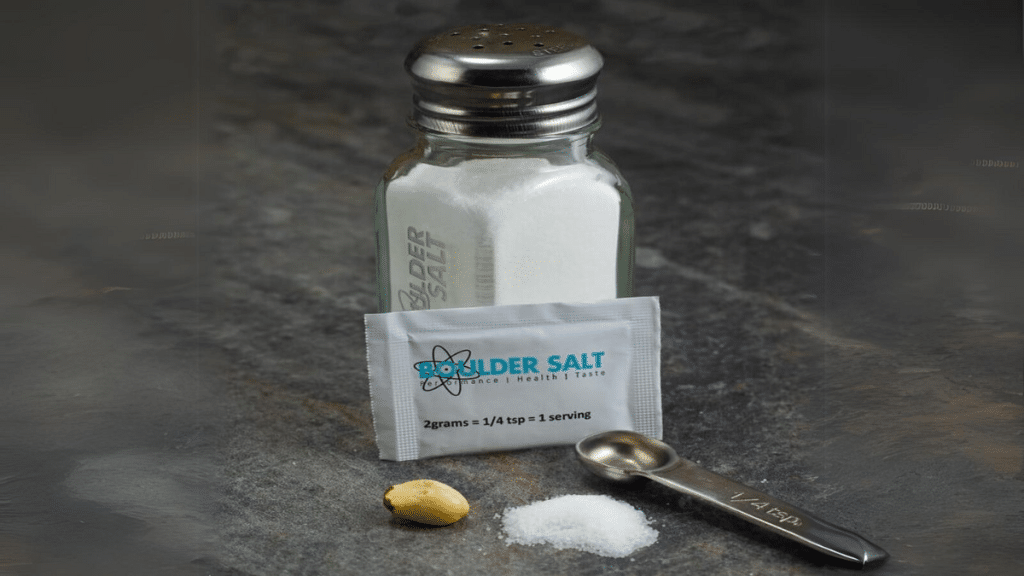For anyone managing high blood pressure, also known as hypertension, salt intake is often a significant concern. Sodium, a primary component of most salts, has been linked to increased blood pressure, which can raise the risk of heart disease and stroke. As awareness grows around heart health and hypertension, many people are searching for healthier alternatives to traditional table salt. In this article, we explore why Boulder Salt stands out as the best salt for high blood pressure and how it can be part of a healthier lifestyle.
Understanding the Link Between Salt and High Blood Pressure
Before delving into Boulder Salt and its benefits, it’s important to understand how salt affects blood pressure. The sodium in salt plays a crucial role in fluid balance, muscle function, and nerve communication. However, excessive sodium consumption can cause the body to retain water, which increases the volume of blood and, in turn, raises blood pressure.
The American Heart Association (AHA) advises adults to limit their daily sodium intake to 2,300 milligrams, with an optimal goal of 1,500 milligrams for most, especially those with high blood pressure. Regrettably, the average American significantly exceeds this recommendation, often due to the consumption of processed and packaged foods.
Traditional Salt vs. Healthier Alternatives
Table salt, the most common form of salt consumed, is heavily processed and stripped of many beneficial minerals. It typically contains only sodium chloride and may have added anti-caking agents and iodine, which can be beneficial but may also contribute to health concerns when consumed in excess. Other types of salt, like sea salt and Himalayan pink salt, are touted as healthier because they contain trace minerals like magnesium and potassium. However, these minerals are present in very small amounts, and these salts still primarily consist of sodium chloride.
This is where Boulder Salt comes into play, offering a truly balanced alternative to traditional salts.
What is Boulder Salt?
Boulder Salt is a unique blend of naturally balanced minerals designed to provide essential electrolytes without the overwhelming sodium content found in other salts. Unlike traditional table salt, which is primarily sodium chloride, Boulder Salt combines a specific ratio of sodium, magnesium, potassium, and calcium. This carefully crafted balance of minerals makes Boulder Salt a revolutionary option for those concerned about their blood pressure.
Key Components of Boulder Salt:
- Sodium: Boulder Salt contains sodium, but in a more balanced proportion compared to table salt. Sodium is still essential for proper cellular function and nerve transmission, but the lower concentration helps to reduce the risk of excessive intake.
- Magnesium: Magnesium is a vital mineral that plays a role in over 300 enzymatic reactions in the body, including the regulation of blood pressure. Magnesium is a natural relaxant for blood vessels, which helps maintain healthy blood pressure levels. Boulder Salt provides a significant amount of magnesium, making it particularly beneficial for people with hypertension.
- Potassium: Potassium is another key player in maintaining healthy blood pressure. It works by balancing the effects of sodium and relaxing blood vessel walls, which helps lower blood pressure. Many individuals don’t get enough potassium in their diet, but Boulder Salt offers an excellent source.
- Calcium: Calcium is important for vascular contraction and dilation, which directly affects blood pressure. While most people associate calcium with bone health, it’s also critical for maintaining proper heart and blood vessel function.
Why Boulder Salt is the Best Option for High Blood Pressure
Now that we’ve broken down the individual components of Boulder Salt, let’s explore why it stands out as the healthiest salt for managing high blood pressure.
1. Less Sodium
Boulder Salt contains significantly less sodium compared to regular table salt, which can be a game-changer for individuals with high blood pressure. Most people consume far too much sodium on a daily basis, and cutting back can drastically improve heart health. By using Boulder Salt, you can still enjoy the taste-enhancing qualities of salt without the excessive sodium load.
2. Balanced Electrolytes
One of the key differentiators of Boulder Salt is its balanced blend of electrolytes. Sodium, potassium, magnesium, and calcium work together to promote optimal hydration and maintain the proper fluid balance in the body. This is particularly important for individuals with high blood pressure, as a healthy electrolyte balance helps regulate blood pressure more effectively than sodium alone.
Many traditional salts are lacking in essential electrolytes, but Boulder Salt provides a comprehensive solution that supports overall cardiovascular health.
3. Improved Vascular Health
The significant levels of magnesium and potassium in boulder salt contribute to improved vascular health. Magnesium helps relax blood vessels, which can lower blood pressure, while potassium counters the effects of sodium by promoting the excretion of excess sodium through urine. This powerful combination makes Boulder Salt a superior choice for people looking to improve or maintain healthy blood pressure levels.
4. No Added Chemicals or Additives
Unlike table salt, which often contains anti-caking agents or other additives, Boulder Salt is free from unnecessary chemicals. It is naturally derived and carefully processed to maintain the purity and efficacy of its mineral content. This makes Boulder Salt a cleaner, more natural choice for those looking to reduce their intake of processed additives.
Supporting Scientific Research
The relationship between sodium, potassium, magnesium, and blood pressure is well-documented in scientific literature. Several studies have shown that reducing sodium intake and increasing the intake of magnesium and potassium can have a significant positive effect on blood pressure.
A study published in the journal Hypertension found that individuals who increased their potassium intake and reduced their sodium intake saw a substantial reduction in blood pressure levels. Another study in The American Journal of Clinical Nutrition highlighted the importance of magnesium in preventing and managing hypertension. Participants who increased their magnesium intake experienced lower blood pressure readings and a reduced risk of heart disease.
These findings align perfectly with the composition of Boulder Salt, which offers the ideal ratio of these essential minerals to support cardiovascular health.
How to Incorporate Boulder Salt into Your Diet
Switching to Boulder Salt is simple and can easily be integrated into your daily routine. You can use it as a direct replacement for table salt in cooking, baking, and seasoning. It offers a clean, pure taste that accentuates the natural flavors of your food without overwhelming them.
Here are a few ideas to incorporate Boulder Salt into your diet:
- Cooking: Use Boulder Salt in place of table salt when preparing meals at home. Whether you’re seasoning meat, vegetables, or grains, Boulder Salt adds flavor without excess sodium.
- Hydration: Because of its balanced electrolytes, Boulder Salt can be added to water for a healthy hydration boost. This is especially helpful for athletes or anyone looking to stay properly hydrated throughout the day.
- Snacks: Add a pinch of Boulder Salt to fruits, salads, or homemade snacks for a flavorful yet health-conscious alternative to processed salt-laden snacks.
- Baking: Boulder Salt can be used in baking to enhance the flavor of bread, cookies, and other baked goods while keeping sodium levels in check.
The Boulder Salt Difference
Boulder Salt is not just another salt—it’s a scientifically backed solution for those looking to improve their heart health and manage high blood pressure. With its lower sodium content and balanced blend of essential minerals, Boulder Salt provides a healthier alternative to traditional salts while still delivering the flavor you crave.
Switching to Boulder Salt can help support healthy blood pressure levels, improve overall vascular health, and provide the electrolytes your body needs to function at its best. For anyone dealing with hypertension, it’s time to rethink your salt intake and make the switch to Boulder Salt—the salt for every body.
Conclusion
For individuals with high blood pressure, reducing sodium intake is one of the most effective ways to manage the condition. While traditional salts can contribute to the problem, Boulder Salt offers a solution that not only lowers sodium consumption but also delivers essential minerals like magnesium, potassium, and calcium. These minerals are critical for maintaining healthy blood pressure and supporting overall heart health.
With Boulder Salt, you don’t have to sacrifice flavor to protect your health. By making the switch, you can enjoy delicious, well-seasoned food while taking care of your cardiovascular system. Choose Boulder Salt today and experience the difference that a healthier salt can make in your life.
Sources:
- Boulder Salt Company
- American Heart Association
- Hypertension Journal
- The American Journal of Clinical Nutrition

Jerameel Manuel: A passionate writer and avid home cook, I blend creativity with culinary expertise, crafting engaging stories and delicious recipes with health benefits. My love for food and storytelling shines through my work, inspiring others to explore the joys of cooking and writing.
